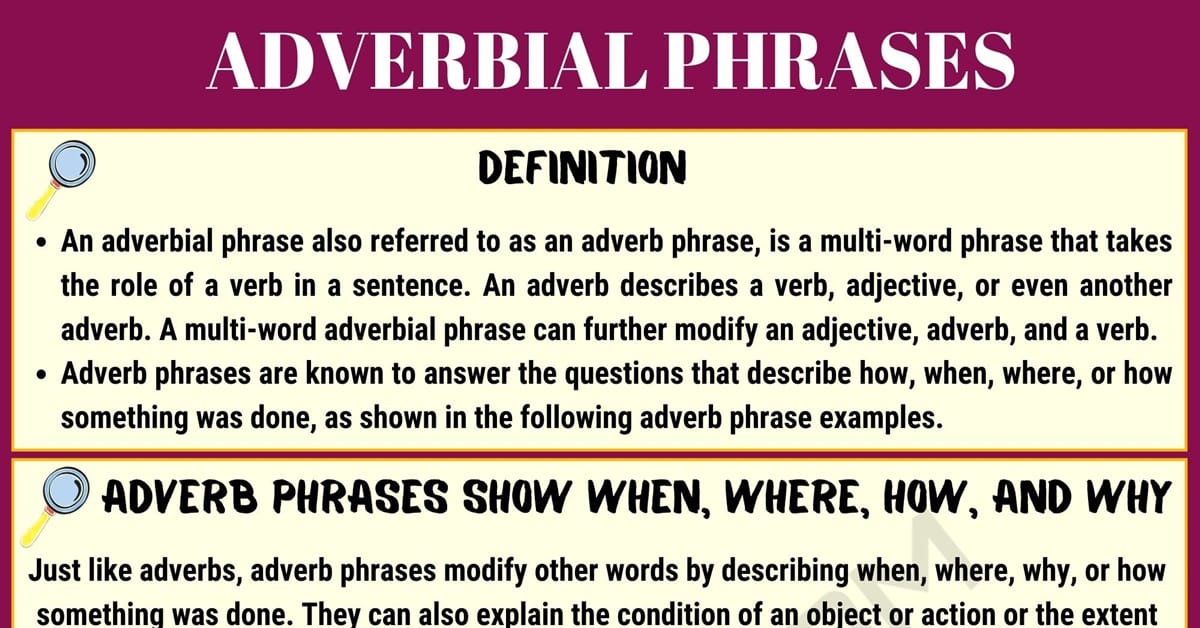What is an adverbial phrase? Learn the adverbial phrase (adverb phrase) definition and useful grammar rules to use adverbial phrases in English with useful example sentences.
Adverbial Phrase (Adverb Phrase)
What Is an Adverbial Phrase?
An adverbial phrase also referred to as an adverb phrase, is a multi-word phrase that takes the role of a verb in a sentence. An adverb describes a verb, adjective, or even another adverb. A multi-word adverbial phrase can further modify an adjective, adverb, and a verb.
Adverb phrases are known to answer the questions that describe how, when, where, or how something was done, as shown in the following adverb phrase examples.
Let’s look at the following sentences:
- I kept the luggage.
- I kept the luggage here.
- I kept the luggage right here.
- I kept the luggage right here in front of the kitchen.
In the first sentence, there is no adverb nor adverb phrase. In the second sentence, there is an adverb “here” that describes where the luggage was stored. In the third sentence, there is an adverb phrase “right here,” which stresses where the luggage was kept and used a phrase rather than a single adverb.
The last sentence features a lengthy, more descriptive adverb phrase. Keep in mind that “right here in front of the kitchen” is a prepositional phrase that employs the preposition “in front” and the object “kitchen.” In such a scenario, the prepositional phrase acts as an adverb in the sentence. It is an adverbial and prepositional phrase because it modifies the verb to give more information about the location.
Adverb Phrases Show When, Where, How, and Why
Just like adverbs, adverb phrases modify other words by describing when, where, why, or how something was done. They can also explain the condition of an object or action or the extent to which an action or object was affected. Let’s look at the following example: “He rode the motorbike as carefully as possible.” Here drove is the verb and as carefully as possible is the adverb phrase which explains how the motorist acted.
Consider the following adverbial phrase examples that describe when, where, how, and why.
Adverbial Phrases that Describe When
- As fast as possible
- Any time
- Today afternoon
- After the break
- Before midnight
Adverbial Phrases that Describe Where
- At home
- Around the sun
- By the mailbox
- Under the table
- Right here
Adverbial Phrases that Describe How
- Quite interesting
- Doing well
- Enjoyable
- Very well
- Quite easily
Adverbial Phrases that Describe Why
- To record a statement
- For committing crime
- For pity’s sake
- To revise thoroughly
- To have a happy marriage
Adverb Phrase Examples
Adverb phrases can be used at any point in a sentence. This is highlighted in the following adverb phrase examples:
- Meet her at the bridge hotel this afternoon.
- Without reasoning, she took away her life.
- He completed the task assigned as quickly as possible.
- To avoid disturbing the sleeping students, David chose to tiptoe to bed.
- He completed the task hurriedly.
- Peter needs to ride her new motorbike much more carefully.
- To have a clear view of the mountain, John climbed to the top.
- She walks to school every day.
- The bride and groom opened their presents with delight.
- This tool is available in all places.
- He reacted very harshly.
- You need to clean your house better than that.
Difference between Adverb Phrases and Adverb Clauses
It’s good to keep in mind that an adverbial phrase is a multi-word phrase that does not feature a subject nor a verb. When you consider the mentioned above adverbial phrase examples, you will notice that “right here in front of the kitchen” does not contain a verb. Instead, it’s just a lengthy-phrase.
An adverb clause, on the other hand, is a multi-word clause that does not contain a subject and a verb. Similar to the adverbial phrase, an adverb clause modifies an adjective, verb, or adverb in the sentence.
An example of this might be:
- I kept the luggage in a place where I could easily find it afterward.
Here the adverbial phrase features a subject and a verb. In this case, “I” is the subject, and “find” is the verb meaning it’s a clause. The adverbial phrase modifies the verb “kept” to describe where the luggage is located.
Always add adverbial phrases to your writing to make it easy for your readers to understand. This also makes the content fun and exciting, thereby encouraging more people to read your work. With the help of the examples outlined above, you should be in a position to recognize and even classify the adverbial phrases in a sentence.









0 Comments